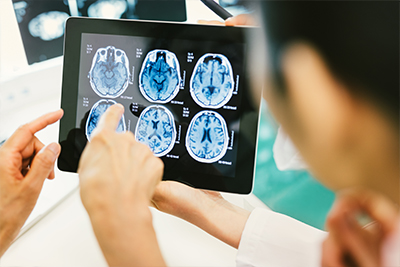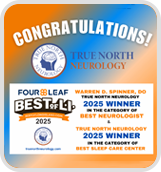Multiple Sclerosis



Healing Harmonies: Music for Multiple Sclerosis
Please join the Synaptic Groove Band’s inspirational concert/lecture on the power of music to help address many symptoms of MS. Special guest lecturers: Dr. Maryana Liedke, True North Neurology MS Expert and a few words from the National MS Society representative.

Why Choose True North Neurology?
True North Neurology specializes in the treatment and management of Multiple Sclerosis. Our MS specialist, Dr. Maryana Liedke is board-certified in Neurology and fellowship-trained in Multiple Sclerosis. Dr. Liedke’s mission is to help people with MS, by providing patients with the latest treatment options backed by research and emerging science with an emphasis on personalized and compassionate care.
What is Multiple Sclerosis?
Multiple sclerosis also known as encephalomyelitis disseminate is an autoimmune disorder of the central nervous system (brain, spinal cord, and optic nerves) that damages the myelin sheath of the nerve cells. This interrupts the transmission of information from the brain to different parts of the body resulting in difficulty with coordination and balance, vision and speech difficulties, tremors, muscle weakness, dizziness, and cognitive difficulties.
Causes of Multiple Sclerosis
Multiple sclerosis is mainly caused by damage to the myelin sheath that forms protective insulation around the nerves and helps in the conduction of nerve impulses. This damage occurs due to an autoimmune process and results in the disruption of nerve impulses and the formation of scar tissue (sclerosis). It can happen in multiple areas throughout the central nervous system. Repeated attacks can cause damage to the underlying nerve as well. It is unclear what causes multiple sclerosis but some of the associated risk factors include:
- Being female
- Allergies
- Viral infection
- Positive family history
- Genetic mutation
- Smoking
- Poor exposure to sunlight causes a vitamin D deficiency
- Vitamin B12 deficiency
- Exposure to mercury or other heavy metals
- Exposure to chemical solvents
- Having an autoimmune condition
Types of Multiple Sclerosis

The most common types of multiple sclerosis include:
- Clinically isolated syndrome (CIS): This is the first stage of multiple sclerosis in which the symptoms last for at least 24 hours and is characterized by inflammation and demyelination in the CNS.
- Relapsing-remitting Multiple Sclerosis (RRMS): This is the most common type of MS characterized by periodic inflammatory attacks on the myelin sheath and nerve fibers resulting in damage to the neurological function. There are periods when the symptoms worsen (relapse) and periods in between when they disappear (remission).
- Secondary-progressive Multiple Sclerosis (SPMS): This is considered the second phase of RRMS as most patients diagnosed with RRMS eventually transition to SPMS. In this condition, the symptoms progress steadily and disability worsens without clear remission.
- Primary progressive Multiple Sclerosis (PPMS): In this condition, symptoms gradually worsen over time without a clear initial episode or periods of relapse and remission.
Symptoms of Multiple Sclerosis
Some of the common symptoms of multiple sclerosis include:
- Bladder problems
- Vision problems
- Tremors
- Muscle weakness
- Fatigue
- Sexual dysfunction
- Pain
- Muscle spasms
- Change in gait
- Numbness or tingling sensation
- Difficulty in walking
- Vertigo
- Anxiety
- Cognitive problems
Diagnosis of Multiple Sclerosis

Your doctor will review your medical history and symptoms and based on this physical and neurological examination will be performed. Your movement, muscle strength, balance, coordination, and vision will be assessed. The following diagnostic tests may be ordered:
- Blood tests: Blood tests are performed to look for certain substances in the blood that can indicate infection or any other diseases.
- Magnetic Resonance Imaging (MRI) Scan: An imaging study that uses a large magnetic field and radio waves to detect the presence of any lesions in the brain and spinal cord. The scar lesions (sclerosis) are visible on MRI.
- Lumbar puncture: Also known as a spinal tap, is a technique in which the fluid is aspirated from the spinal canal and analyzed to detect the presence of antibodies that indicate infections and certain proteins characteristic of multiple sclerosis.
- Evoked Potential Test: In this method, electrodes are placed behind your head that record electrical signals produced by the brain in response to the electrical and visual stimuli.
- Optical Coherence Tomography (OCT): This test is performed as people with multiple sclerosis can develop visual problems. This non-invasive imaging technology uses infra-red rays to produce cross-sectional images of the retina.
Treatment for Multiple Sclerosis
There is no specific treatment available for multiple sclerosis, but the treatment measures generally focus on slowing the progression of the disease. They include:
- Disease-modifying therapies (DMTs): Your doctor will prescribe oral or injectable medicines to help reduce the relapses and slow down the progression of the disease.
- Relapse management medications: This involves administering a high dose of corticosteroids intravenously to help relieve inflammation associated with a relapse.
- Plasma exchange: This involves the removal of the plasma component of the blood and replacing it with a substitute to eliminate antibodies in the plasma that attack the nervous system.
- Medications for specific symptoms: Depending on your situation you may receive medication for fatigue, muscle spasticity, pain, difficulty walking, eye problems, depression or anxiety, and bladder and bowel problems.
- Stem cell therapy: This is a form of regenerative medicine that utilizes the body’s stem cells to restore the immune system.
- Alternative therapies: Certain alternative therapies such as acupuncture can help manage symptoms such as pain and spasticity.
- Rehabilitation: This helps to maintain and improve your ability to perform effectively, this includes:
- Physical therapy: Your doctor may recommend physical therapy to strengthen muscles, relieve fatigue and restore functional ability and movement.
- Occupational therapy: This involves therapy to improve your functional capacity for routine activities and specific tasks.
- Cognitive rehabilitation: This helps to manage thinking and perception skills.
- Speech and swallowing therapy: This helps to treat speech and swallowing disorders.
- Social support and counseling: To help address anxiety, depression, outbursts, and financial issues.
Preventing Multiple Sclerosis

Certain lifestyle modifications and measures may help prevent a relapse of multiple sclerosis. These include:
- Stress management
- Quitting smoking
- A healthy diet
- Vitamin D supplementation
- Maintaining weight
- Heat and massage treatment
- Regular exercise
If you or someone you know may have Multiple Sclerosis, we can help. Contact True North Neurology at 631-364-9119 or click below to schedule an appointment today.
You will need the Adobe Reader to view and print these documents.











